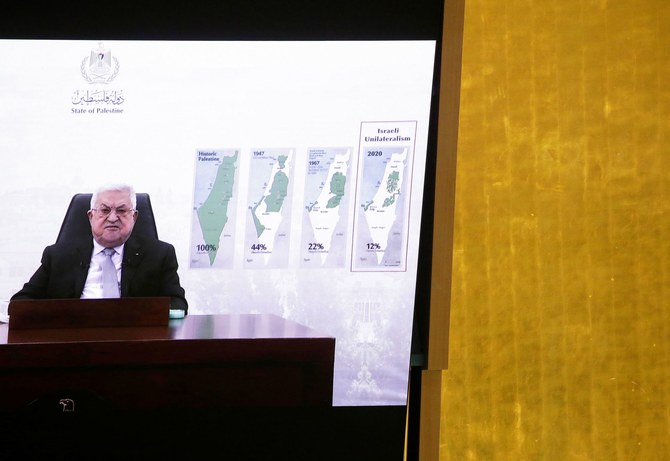
- ARAB NEWS
- 18 Jul 2025

Every year, and for many decades, at the UN General Assembly’s September meetings, the Arab-Israeli conflict and the Palestinian question are tackled in speeches by concerned world leaders.
Until recently, the dividing line was quite clear: A majority of countries supported a negotiated settlement based on UN Security Council resolutions that provided the bedrock for the so-called two-state solution. The classical definition of that solution calls on Israel to withdraw to the June 1967 armistice lines to allow for the creation of a Palestinian state in the West Bank and Gaza, with East Jerusalem as its capital. Needless to say that Israel has never accepted that premise.
Four years of Donald Trump’s presidency tried to change the long-standing paradigm, albeit by leaning heavily toward Israeli positions. His Middle East peace plan never took off and was rejected by the Palestinians, but it broke the decades-old barrier of the Arab boycott of Israel. The Abraham Accords bypassed the condition of Israeli withdrawal in return for recognition and instituted the principle of peace in return for peace. Naturally, the Palestinians were left out of the equation.
But in his first UNGA speech since being elected president, Joe Biden sought to reset US policy on the Israel-Palestine conflict without actually reversing Trump’s most important unilateral moves — the recognition of a united Jerusalem as Israel’s capital and the relocation of the embassy from Tel Aviv.
The reality is that Israel finds itself in a world where no party is willing to exert pressure to launch a new political process.
Osama Al-Sharif
Instead, Biden reiterated America’s embrace of the two-state solution, while acknowledging that it is “a long way away” for Israel and the Palestinians. He underlined his belief that “a two-state solution is the best way to ensure Israel’s future as a Jewish democratic state, living in peace alongside a viable, sovereign and democratic Palestinian state.”
Biden added: “We are a long way from that goal at this moment, but we must never allow ourselves to give up on the possibility of progress.”
His message seemed to resonate with what analysts had concluded before — that the Biden administration will not engage parties in a new peace process, and that all it will do is manage the conflict in a bid to improve the lives of Palestinians in both the West Bank and Gaza, keep the Palestinian Authority from collapsing, reopen the US consulate in East Jerusalem and support UNRWA.
Having appeared many times before the UNGA, Palestinian President Mahmoud Abbas chose to address the gathering virtually from Ramallah. His speech, described by his aides as historic, was a mixture of lamentations, accusations and threats. He accused Israel of destroying the two-state solution, warning that could lead Palestinians to demand equal rights within one bi-national state comprising Israel, the West Bank and Gaza.
Abbas, whose popularity among Palestinians has sunk to a record low, threatened to rescind the Palestinians’ recognition of Israel if it did not withdraw from the West Bank, Gaza and East Jerusalem within a year. It was not the first time that the 85-year-old leader had issued ultimatums against Israel, none of which he actually carried out. This time he also talked about adopting other options.
His speech was mocked by Israelis and even some Palestinians. Abbas finds himself in an unenviable position: His Fatah movement is fractured, the PA is almost bankrupt, Hamas has shunned attempts to end the Palestinian fracture, and the EU has lambasted his human rights abuses. He is still waiting to be invited to the White House, which is unlikely. Jordan and Egypt are pressuring him to choose a successor and carry out reforms.
Then it was Israeli Prime Minister Naftali Bennett’s turn to deliver his speech. Even before he left Israel, his aides said that the focus of the speech would be on Israel’s unique role in the world — the so-called Israeli story. They said he would underline the need to take action against Iran and the opportunity to build on the Abraham Accords. There was no mention of the Palestinians, as if the 54-year Israeli occupation of more than 5 million people did not exist or was not even an issue.
Aside from focusing on Israel’s success as a nation, both regionally and globally, Bennett urged the world to take action against Iran. When speaking about peace, he praised the Abraham Accords as the way to move forward. Bennett had nothing to offer the Palestinians — just like his predecessor.
The reality is that Israel finds itself in a world where no party is willing to exert pressure to launch a new political process, not to mention force Israel to stop its illegal settlement activities. Israel will offer nothing for the Palestinians other than a marginal improvement in their daily lives at best. The legal and political contradictions of the longest occupation in modern history will go on for the foreseeable future. The question is: Can Israel ignore the occupation indefinitely?